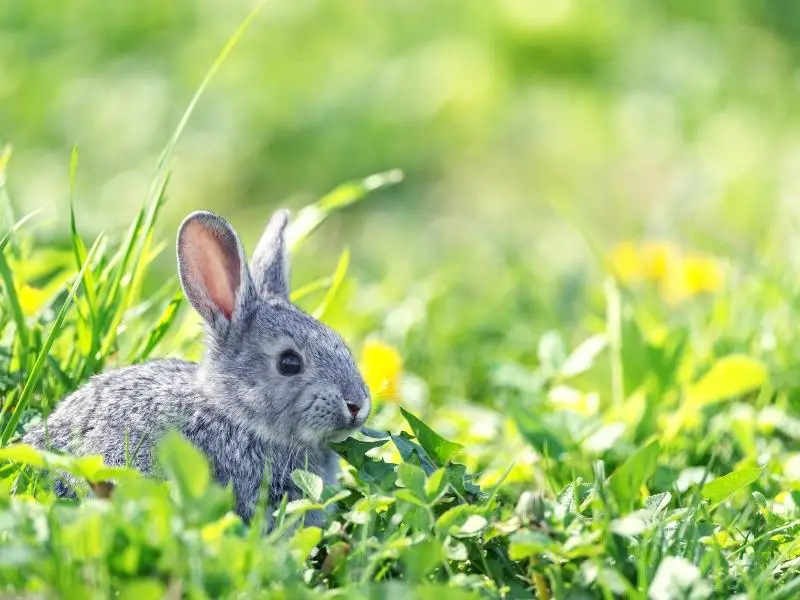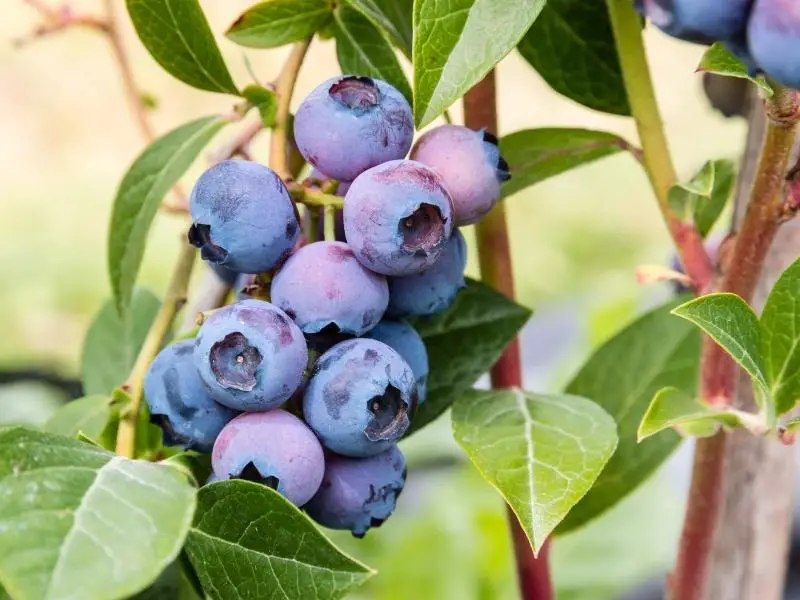Did your pet rabbit get into the blueberries and other groceries you accidentally left on the floor (instead of putting them on the kitchen counter)? You probably got really worried, right?
Should rabbits eat blueberries, and are they safe?
Rabbits can safely eat blueberry fruit, leaves, and stems. However, blueberries are high in sugar, making them suitable as an occasional treat or reward when you train your rabbit. Too much sugar isn’t good for rabbits; it can lead to obesity, dental problems, and other health issues.
Ready to learn more about rabbits, blueberries, and the benefits and risks of these fruits? We’ve got everything you need to know.
Can Rabbits Safely Eat Blueberries?
Rabbits can safely eat blueberries. These yummy fruits aren’t part of your bun’s daily diet since they are high in fructose – sugar.
It’s best to occasionally feed your rabbit organic, fresh blueberries. Always rinse the berries under running water to remove any pesticides and chemicals that were used during the growing process.
Frozen blueberries won’t harm your rabbit, and they can be a refreshing treat on hot summer days. However, frozen blueberries contain less nutritional value, so they aren’t as healthy as fresh blueberries.
Stay away from dried and dehydrated blueberries as these are really high in sugar.
Can Rabbits Eat Blueberries With Skin?
No one would willingly want to remove a blueberry’s skin. That is quite a delicate and time-consuming job.
Luckily, it’s perfectly safe for your bun to eat blueberries with the skin on.
Plus, most of the nutritional value in the forms of antioxidants (like anthocyanins) and fiber are in a blueberry’s skin. These make the treatment much healthier for your rabbit.
Can Rabbits Eat Blueberry Seeds?
The seeds inside a blueberry are tiny, so like with the skin, no one would want to remove these. But these are safe, so you don’t need to worry about your rabbit eating blueberry seeds.
Can Rabbits Eat Blueberry Plant Leaves and Stems?
Wild rabbits would preferably munch on blueberry plant leaves and stems, but your pet bunny is often spoiled for choice and they easily develop a sweet tooth.
Thus, domesticated rabbits would rather go for the blueberry fruit, but it is safe for them to eat the leaves and stems.
Benefits of Feeding Blueberries to Rabbits

Blueberries are very nutritious, and they are healthy for people AND rabbits. But like everything else, your rabbit should eat blueberries in moderation.
These fruits, however, are healthier than many other treats. They are:
- Lower in sugar
- Lower in calories
- Higher in protein
- Higher in fiber
Here are some of the benefits these delicious small blueberries have:
High in Fiber
A blueberry has more fiber than most other fruit.
A rabbit needs a lot of fiber to keep their digestive systems running and wear down their teeth. But your bun needs fiber from roughage (aka hay).
So while the fiber in blueberries is good for your rabbit, it isn’t the main source of fiber they need.
High in Vitamins and Minerals
Blueberries are also antioxidant-rich, and these fruits contain lots of vitamins A, B6, and K, folate, potassium, magnesium, phosphorus, and manganese.
These berries help improve blood flow, lower blood sugar, and decrease the risk of cancer, diabetes, and heart disease.
High Water Content
Blueberries are 84% water. Your rabbit needs to consume enough water so it can stay hydrated. Water also helps ensure your bun has proper bowel movements and doesn’t overheat.
While you don’t want to give your rabbit too many blueberries, this is a tasty treat on hot days.
Risks of Feeding Too Many Blueberries to Rabbits
As with other foods, there are various risks when your bun indulges too much.
Here are the risks of feeding too many blueberries to your bunny:
High in Sugar
While blueberries have a lower sugar content than most other fruits, they contain too much sugar for rabbits.
Rabbits don’t need sugar for energy or as part of their daily dietary requirements.
So while some sugar is okay, too many blueberries (and thus sugar) cause issues like bloating and tummy ache. Your bun may even suffer from GI stasis or diarrhea.
Too much sugar also leads to dental issues.
Obesity
A diet that’s high in sugar also causes your rabbit to put on weight, and this could lead to obesity.
A rabbit that’s overweight struggles to groom itself, eat their cecotropes (which leads to malnourishment), and move around. In essence, a bunny that’s obese isn’t a healthy bunny.
How Many Blueberries Can I Give My Rabbit?
Blueberries aren’t part of a rabbit’s diet; these fruit treats can be used as rewards. Your rabbit’s diet comprises mostly hay, leafy greens, and rabbit-friendly pellets.
So only feed your pet bunny blueberries once or twice a week.
How many blueberries can you give to your rabbit? Only one or two blueberries.
We know; it isn’t a lot, but it’s more than enough for your bun. Rabbits are picky eaters, and domestic rabbits can develop quite the sweet tooth and refuse to eat their other food.
Limit blueberries and access to treats, and your bun will be just fine.
Can Baby Rabbits Eat Blueberries?
Baby rabbits should not eat blueberries. These treats are only suitable for adult rabbits because their digestive systems are fully developed.
Small breed rabbits are mature at 3-4 months, medium breed rabbits are mature at the 4-6 month mark, while large and giant breed rabbits are only mature at 6-9 months.
When you introduce blueberries, start slowly and monitor your rabbit. If you see that their tummy is uncomfortable or they have runny poop, stop feeding your rabbit blueberries.
However, if your rabbit is perfectly fine after they’ve eaten blueberries, you can include it as a regular treat 1-2 times a week.
My Last Bunny Thoughts
It’s important to keep your rabbit’s digestive system healthy. To do this, ensure your pet rabbit eats a balanced and healthy diet that includes hay, leafy greens, pellets, and treats.
Rabbits enjoy eating blueberries, but since not all rabbits are the same, monitor your rabbit when you first start feeding these fruits.
Related Articles:

